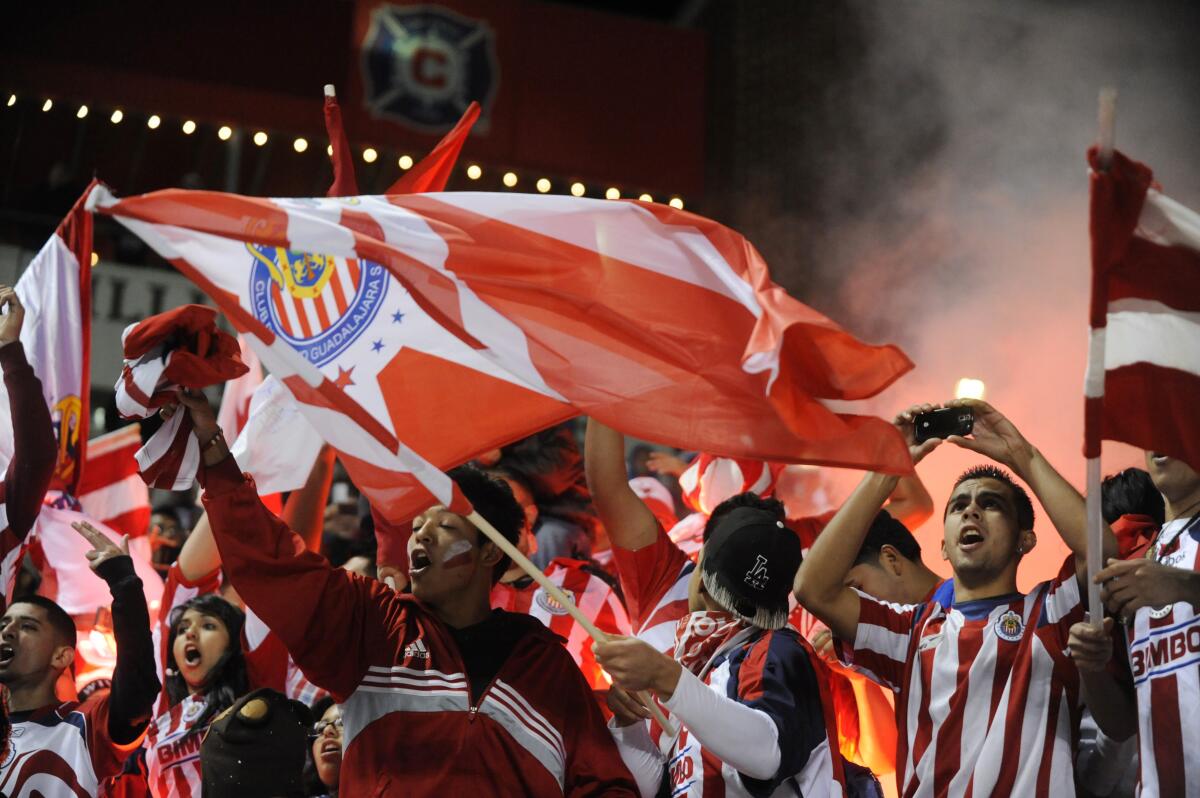Chivas’ Mexican pride is more valuable than Liga MX titles — for now

- Share via
For the last 77 years, you needed two things to play soccer for Chivas of Guadalajara: a wealth of talent and a Mexican passport.
But as the country’s once-homogenous first division has rapidly grown more diverse, Chivas’ Mexican-players-only rule now hangs around the club’s neck like an anachronistic albatross. This season, more than a third of the players in Liga MX are foreign-born, as are 10 of the 12 leading scorers.
Appealing to Mexican nationalism by refusing to sign foreign players has made Chivas one of the country’s most popular clubs. But it’s also a big reason the team has won just two titles this century and only three since Mexico went to the short-tournament format in 1996. However, Ricardo Peláez, the team’s director of football operations, said the club won’t be changing course any time soon.
Chivas, 11th in the 18-team Apertura standings with five games to play, will be in Los Angeles on Wednesday at 7:30 p.m. to play C.D. FAS, El Salvador’s most successful team, in a friendly at Banc of California Stadium. FAS, which leads the Salvadoran first division halfway through the 22-game season, has a roster that includes Dustin Corea, a 29-year-old Los Angeles native who has played for eight clubs in six countries.
“It’s an honor to work with full Mexicans. There are things that should not change,” Peláez said in Spanish of the club’s nationality rule. “Football as a sport is very important on a social level because it allows millions of people to feel identified with a team and therefore be part of a group. But the identification is not by the colors or the crest, it is by the philosophy, the history they represent.
“In the case of Chivas, it cannot renounce that. Chivas represents absolute trust in Mexicans. Chivas is nationalism. It is being of the people and for the people.”
Peláez used a multinational roster to guide Club América, Chivas’ mortal enemy, to three titles between 2011 and 2017 before moving to Guadalajara last year. That’s a little like Brian Cashman leaving the New York Yankees to become general manager of the Boston Red Sox.
But Peláez, who also played for both teams, didn’t find the switch particularly strange.
“The fact that you have identification with a shirt or some colors has nothing to do with whether you do your job well or badly,” he said. “Of course, they are different. ... Today, I am with Chivas, which I have no doubt is the most beloved club in Mexican soccer.”
Part of the reason for that is the Mexican-only rule, which really isn’t a rule at all.
Although Chivas was founded at the start of the 20th century by Belgian and French students living in Guadalajara, the club quickly split with one faction, led by Mexican workers inspired by the country’s revolution, insisting the team field only native-born players.
That suggestion wasn’t always followed. But in 1944, when the country’s first national professional league was established, the club again vowed to use only Mexicans. That agreement among some of the club’s directors was never written down or voted on. In fact, it inspired debate for years. But it persisted and when the team won seven league titles between 1957 and 1965, strict nationalism became a club tenet.
Mexican soccer has changed dramatically since then. Liga MX is now one of the richest leagues in the Western Hemisphere, making it a destination for top South American players. In fact, so many foreigners have flooded into Liga MX that the league imposed a limit of 10 non-homegrown players on each roster this season, with no more than eight allowed to dress for each game.
The NWSL had been riding high with soaring TV ratings and exciting new ownership groups. Now it faces a reckoning that can only be solved by elite former U.S. players trusted with executive roles.
Chivas has cut itself off from those players — and it’s no longer fielding the top Mexicans either. Eleven years ago, Chivas sent five players to the World Cup with the national team, most of any Liga MX team. It has just two players on the Mexican roster for this month’s World Cup qualifiers. Three league rivals are sending more.
“Chivas is living in rules of engagement nobody lives by today,” said former U.S. international Hérculez Gómez, who played for five teams in Mexico. “It was all fun for Chivas when they would only allow four or five foreigners. It was easy for them. They had the best Mexican players. They competed.
“That’s not the case today. [They’re] not on an even playing field.”
Chivas relaxed its rules under the ownership of Jorge Vergara, signing Californians Jesús Padilla, Isaác Brizuela and Miguel Ángel Ponce, among others. Those players were born to Mexican parents, qualifying them for citizenship.
Peláez said last spring that he would like to recruit more dual nationals. In the meantime, Chivas will rely on its developmental academy, which once produced the likes of Javier “Chicharito” Hernández, Carlos Vela and Carlos Salcido. Wednesday’s friendly is an opportunity to audition some of the academy’s current prospects, while for FAS the game provides a chance to interact with its fans in Southern California, home to the largest concentration of Salvadorans in the U.S.
There was hope — or fear, depending on your perspective — that Chivas might do away with the Mexican-only rule entirely when Amaury Vergara, a U.S.-educated filmmaker, took over as owner after his father’s death in 2019. But Vergara, 34, has so far stayed the course and with Liga MX having suspended relegation, Gómez said there’s no reason to change a policy that has hurt the team on the field but remains wildly popular with supporters.

“Their fan base has been content because it’s a sense of pride,” said Gómez, a soccer analyst for ESPN. “But sooner rather than later you’re going to see things changing.”
“When the dollars run out, when the second-, third- and fourth-generation Mexican Americans in the States no longer have an appetite for it, that’s when it’ll change,” he added.
In addition to holding firm on Chivas’ policy regarding citizenship, the younger Vergara has also inherited his father’s impatience, last month firing his third coach in two years. His father changed managers 26 times in 17 years.
“That’s not just a Chivas issue. It’s a Mexican issue— and the world in general,” Peláez said. “Obviously, if we do not get results, we are all exposed to a change. It’s the most logical thing.”
But Peláez has one thing on his side: He was born in Mexico.
More to Read
Go beyond the scoreboard
Get the latest on L.A.'s teams in the daily Sports Report newsletter.
You may occasionally receive promotional content from the Los Angeles Times.









